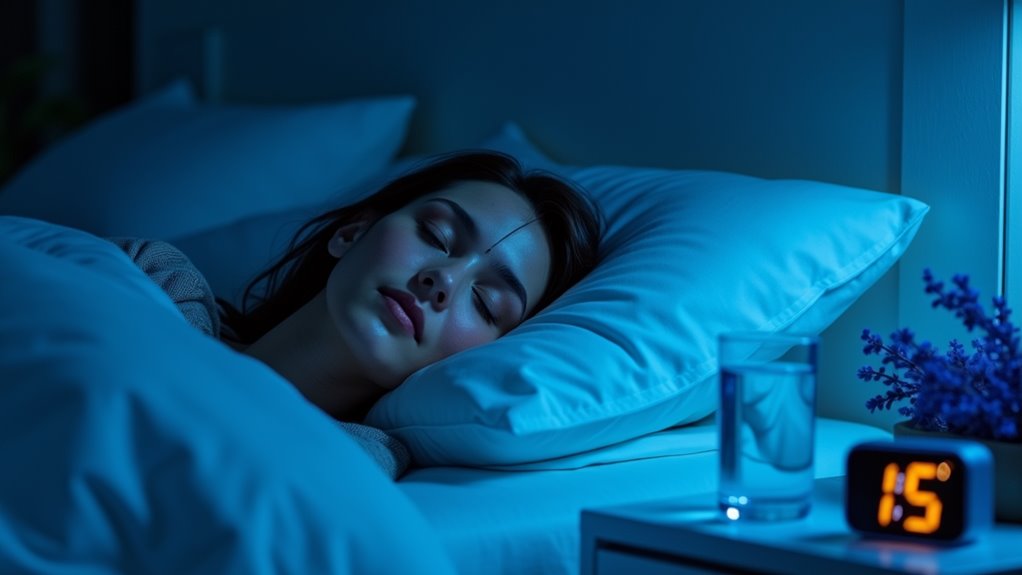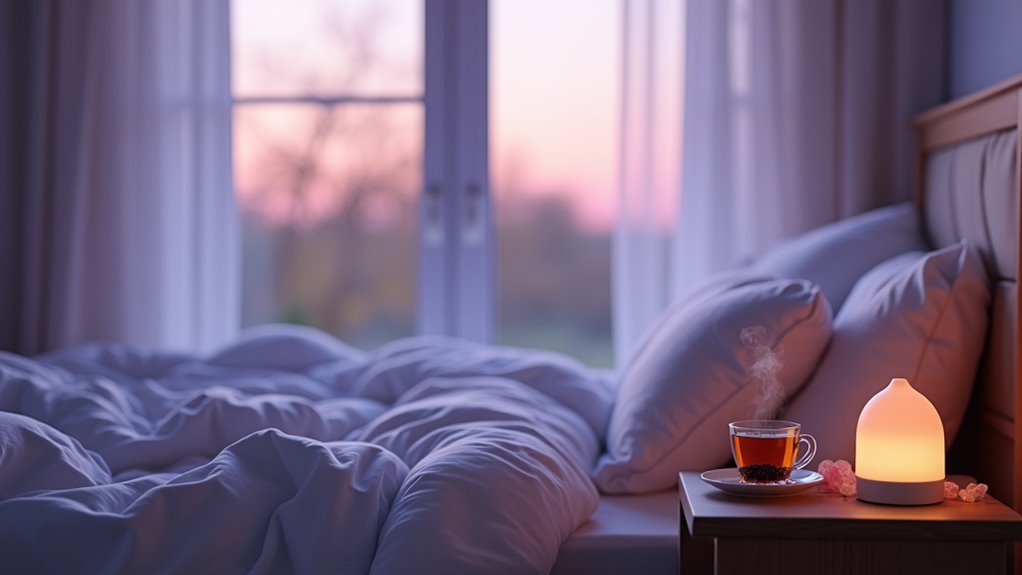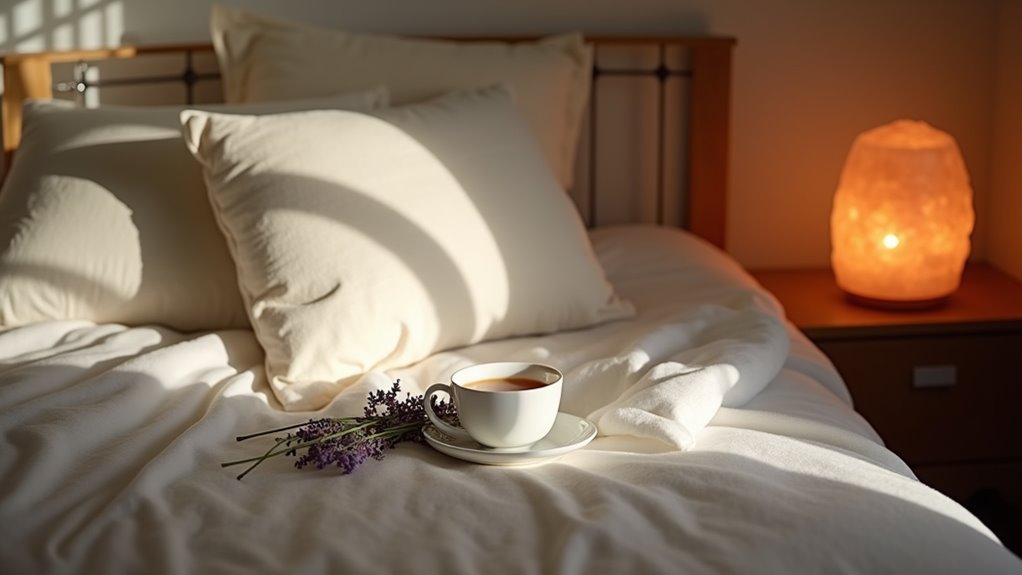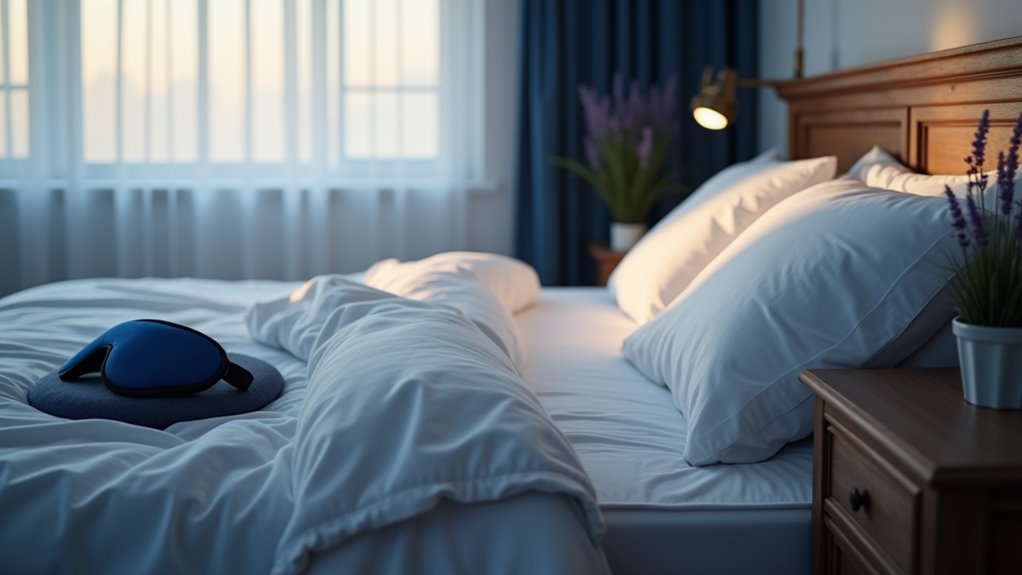You can dramatically improve your sleep quality by aligning your habits with your body's natural rhythms. Your brain relies on specific chemical changes and circadian patterns, which you can optimize through strategic practices. Start by creating an ideal sleep environment that's cool, dark, and quiet, while establishing a consistent evening routine that signals bedtime to your body. Smart nutrition choices, like avoiding caffeine after 2 PM and eating magnesium-rich foods, support your sleep chemistry. Natural methods like deep breathing, meditation, and aromatherapy can further enhance your rest. The path to rejuvenating sleep combines both art and science.
Key Takeaways
- Create a consistent sleep schedule with fixed bedtimes to regulate your body's natural circadian rhythm and melatonin production.
- Optimize bedroom conditions with cool temperatures (60-67°F), complete darkness, and minimal noise for quality sleep.
- Practice relaxation techniques like deep breathing or meditation before bed to calm your nervous system.
- Avoid caffeine after 2 PM and limit alcohol before bedtime, as both substances can disrupt sleep patterns.
- Establish a wind-down routine including dim lighting and reduced screen time to prepare your body for rest.
Sleep Biology and Brain Chemistry

While you sleep, your brain undergoes complex chemical changes that regulate your sleep-wake cycle. Your body produces melatonin as darkness falls, making you feel drowsy, while adenosine builds up throughout your day, increasing sleep pressure.
During sleep, your brain cycles through distinct stages, each serving crucial functions. You'll experience both REM and non-REM sleep phases, with your brain waves shifting from the rapid beta waves of wakefulness to slower delta waves in deep sleep.
Your hypothalamus acts as your internal clock, responding to light and dark signals to maintain your circadian rhythm. Meanwhile, neurotransmitters like GABA and serotonin help calm neural activity, allowing your brain to restore itself and consolidate memories from your day.
Environment and Sleep Design
Since your bedroom's environment directly impacts sleep quality, creating the right conditions is essential for restorative rest. You'll want to keep your room dark, quiet, and cool – ideally between 60-67°F (15-19°C).
Blackout curtains or an eye mask can block disruptive light, while earplugs or white noise machines help mask unwanted sounds.
Your bed setup matters too. Choose a supportive mattress that matches your sleeping position and body type, along with pillows that maintain proper spine alignment.
Breathable, natural fiber bedding helps regulate temperature throughout the night. Remove electronic devices from your bedroom, or at least keep them several feet from your bed, as their electromagnetic fields and blue light can interfere with your sleep cycles.
Evening Routines That Work

Although many people focus on their morning routines, your evening habits play an equally crucial role in sleep quality.
You'll want to establish a consistent wind-down sequence that signals your body it's time to rest. Start by dimming lights and switching off electronics an hour before bed to reduce blue light exposure.
Set a specific time to stop working and begin relaxation activities like reading, gentle stretching, or meditation. You might enjoy a warm bath or shower, as the subsequent cooling of your body temperature promotes drowsiness.
Keep your bedtime consistent, even on weekends, and avoid heavy meals within three hours of sleep. Write down any lingering thoughts or tomorrow's tasks to clear your mind, allowing you to drift off more peacefully.
Nutrition and Sleep Quality
Your food and drink choices throughout the day directly impact your sleep quality at night. To promote better rest, avoid caffeine after 2 PM and limit alcohol consumption, especially close to bedtime. While alcohol might make you drowsy initially, it disrupts your sleep cycles later.
Focus on eating a balanced dinner at least three hours before bed. Include foods rich in tryptophan, such as turkey, eggs, and dairy, paired with complex carbohydrates to help your body produce sleep-inducing serotonin.
Magnesium-rich foods like nuts and leafy greens can also support quality sleep.
If you're hungry before bed, opt for light snacks like banana with almond butter or a small serving of yogurt.
Remember to stay hydrated during the day but reduce fluid intake in the evening to prevent midnight bathroom trips.
Natural Sleep Enhancement Methods

Several natural methods can help enhance your sleep without relying on medication.
Try deep breathing exercises or progressive muscle relaxation before bed to calm your nervous system. You'll find meditation and gentle yoga particularly effective at reducing nighttime anxiety and racing thoughts.
Create an environment that promotes rest by keeping your bedroom cool, dark, and quiet.
Consider using white noise machines or nature sounds to mask disruptive noises. Essential oils like lavender and chamomile, whether diffused or applied topically, can trigger sleep-inducing responses in your brain.
You can also try brewing caffeine-free herbal teas, such as valerian root or passionflower, known for their natural sedative properties. A warm bath or shower 90 minutes before bedtime helps lower your core body temperature, signaling it's time to sleep.
Frequently Asked Questions
Can Sleep Medications Affect My Ability to Wake up During Emergencies?
Yes, sleep medications can impair your ability to respond to emergencies.
When you take sleep aids, they can make you groggy and slow your reaction time, even after you wake up.
This "hangover effect" might prevent you from hearing alarms or responding quickly to urgent situations.
If you're concerned, consider discussing alternative sleep solutions with your doctor, like cognitive behavioral therapy or lifestyle changes.
How Do Different Sleep Positions Impact Long-Term Spinal Health?
Your sleep position significantly affects your spine's alignment and long-term health.
Back sleeping maintains natural spinal curves and distributes weight evenly.
Side sleeping, with proper pillow support between your knees, keeps your spine neutral.
Stomach sleeping puts stress on your neck and lower back, often causing misalignment.
If you're a stomach sleeper, you'll want to gradually train yourself to sleep in a healthier position.
Why Do Some People Talk or Walk During Sleep?
You'll experience sleep talking or walking when your brain remains partially awake during sleep. These behaviors, known as parasomnias, occur when you're transitioning between sleep stages, particularly during non-REM sleep.
Stress, anxiety, fever, sleep deprivation, or certain medications can trigger these episodes. While your brain's motor centers stay active, you're not fully conscious, which explains why you typically won't remember these nighttime activities the next morning.
Does Sleeping With Pets Affect Sleep Quality Differently for Men and Women?
Pets provide peculiar sleeping patterns for different individuals.
If you're a woman, you'll likely experience better sleep quality with your pet in bed, as studies show women feel more secure and relaxed.
However, if you're a man, you might face more sleep disruptions. Your pet's movement, snoring, or territorial behavior can affect your rest differently based on your gender – women generally adapt better to these disturbances than men do.
Can Certain Genetic Factors Make Someone Naturally Require Less Sleep?
Yes, your genes can influence how much sleep you need.
Scientists have identified specific genetic mutations, like the DEC2 gene variant, that allow some people to function well on just 6 hours of sleep. If you're a "short sleeper," you'll naturally wake up after fewer hours feeling refreshed.
However, these genetic variations are rare, and most adults still require 7-9 hours for optimal health.
Conclusion
While you've learned how to craft the perfect sleep sanctuary, manage your circadian rhythms, and optimize your nutrition, you're likely still scrolling through your phone in bed right now. Isn't it ironic? The more we understand about sleep science, the less we actually sleep. So tonight, try this revolutionary concept: put down this article and simply close your eyes. Sweet dreams.

Leave a Reply